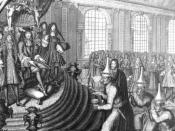The development of modern absolutism began with the emergence of European nation-states toward the end of the 15th century and flourished for more than 200 years. It is, best exemplified by the reign (1643-1715) of King Louis XIV of France. His declaration 'L'état, c'est moi' ('I am the state') sums up the concept of the Divine Right of Kings. The factors that led the English to not travel the road to absolutism, unlike their French counter parts, are complicated and occurred over long period of time. The intermixture of the struggle between monarch and parliament, mainly The House of Commons, with their religious struggle between Protestant and Catholic and the difference in time and setting of the English War of the Roses with the French Fronde all had a part in causing England to become a constitutionalist state. These 'accidents' of history that made the English ruling houses so different from the French one in terms of ability to command allegiance and sustain legitimacy.
However, in the era's to come, a series of revolutions, the first of which was in England, gradually forced the monarchs of Europe to yield their power to parliamentary governments.
Religious differences led to the founding of an English constitutionalist state. The ideals of the two major churches, Roman Catholic and Protestant, during the 16th century carried over into governments their respective states. Catholic states such as France followed the Catholic belief of having one leader, the pope, while the Protestant view of having all followers equal was applied in England. This Anglican thought instilled among Anglicans the notion that everyone had a say in the government. Englishmen could economically back this up with they fact that they paid taxes. James I and Charles I were compassionate towards Roman Catholics, this was exemplified by their treatment...


